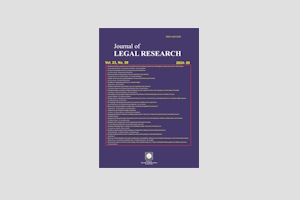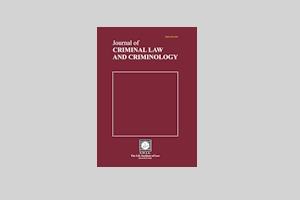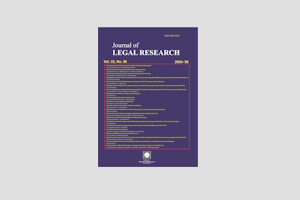Journal of
Private Law
Number 6
Vol. 3 ● No. 6
Autumn 2015 – Winter 2016
Managing Editor: Vahid Eshtiagh
CONTENTS
Articles
Party Autonomy and Its Limits in International Contracts
Mashaallah BANA NIASARI
Reduction of Consideration in Commutative Contract
Hossein ESMAILY
Traditional Knowledge and Necessity of its Protection in the Intellectual Property Law
Mohammad Hadi MIRSHAMSI & Narges JORFI
Electronic Documents under the Iranian Law
Ali Akbar ADIB
Relationships and Commitments of Banks in Letter of Credit in the light of the Provisions of UCP600
Hossein GHORBANIAN
Punitive Damages on French Civil Liability
Shima ATTAR
Articles
Party Autonomy and Its Limits in International Contracts
Mashaallah BANA NIASARI
Abstract:
While today principle of party autonomy in determining law applicable to contracts have gained general acceptance in national codes and international instruments, Art. 968 of Iranian Civil Code doesn’t give the right to Iranian nationals in choosing law applicable to international contracts, if the contract was concluded in Iran territory. Having studied authoritative national codes and international instruments, one can find the Iranian civil code position (i.e., Art. 968) is not defensible in this respect. However, even the legal systems that give the right to choice the law applicable to contract to contractual parties; this right is not absolute and limitless. Beside the conditions and parameters for applying this right, all legal systems receptive to party autonomy in determining law applicable to contracts place barriers and limits upon applying parties’ choice of law. Public policy and mandatory rules are limits for applying foreign choice of law applicable to contractual relationships. But question here is that public policy and mandatory rules of which country limits party autonomy of parties to contract? This article after brief survey of party autonomy in determining law applicable to international contracts, upon national codes and international instrument examine answers that have been gave to the above question from comparative and international perspective.
Keywords: conflict of laws, party autonomy, Lex Limitativa, mandatory rules, ordre public international.
Reduction of Consideration in Commutative Contract
Hossein ESMAILY
Abstract:
In this research the main issues are, among others, identification of the span, benefits and conditions of the application of the right of “reduction of consideration” in international documents and laws of some European countries. It was explained that in laws of some European countries and substantial international documents, the right of “reduction of consideration” was not recognized inclusively for acquisition contracts, and it constitutes a general principle in the law of contract and may be applied in all contracts for valuable considerations. We continued to discuss the idea that the right of compensation is the same as “reduction of consideration” and that it was accepted as a general principle in our country. Then, we proposed that such right be recognized in the law of our country because of the benefits of this right, such as easy integrated compensation for losses of obligees and shorter proceedings.
Keywords: reduction of consideration, performance not conforming to the contract, breach of contract, contract damage.
Traditional Knowledge and Necessity of its Protection in the Intellectual Property Law
Mohammad Hadi MIRSHAMSI
MA of Intellectual Property Law
Abstract:
Traditional knowledge is dynamic structure for producing and formed finding from nature without machine that has roots in past generation. Traditional knowledge as part of a dynamic and fluid, rooted in tradition, customs, climate conditions and needs of indigenous communities, they form an important part of cultural and social heritage and their identity. Compatible with the climate and the local life, the importance of traditional knowledge of indigenous peoples in economic development and the impact of this knowledge in the sciences and modern innovations, has the originality, durability, mobility and economic value and as a result some of the abuse , illegal appropriation and exploitation of its owners brought it without rights. Hence the legal protection from the owners of indigenous communities of this knowledge are essential, based on the requirements of human rights and as the best framework for protecting intellectual property system is proposed. Measures and studies World Intellectual Property Organization to promote the protection of indigenous peoples’ knowledge is valuable and significant, passing appropriate international rules which is the first and most effective step for widespread support of the owners of this knowledge requires the cooperation of all countries, especially countries with indigenous communities and it is necessary to Iran shows more activity, in this context and in line with the pass of appropriate national legislation.
Keywords: traditional knowledge, know-how, traditional, indigenous communities, and intellectual property rights.
Electronic Documents under the Iranian Law
Ali Akbar ADIB
Abstract:
The admissibility and evidential weight of electronic evidence is of much importance from the viewpoint of both substantive and procedural law. Enacting The Electronic Commerce Act in 2003 (1382) by the Iranian Legislature can be significant as per procedural law as well as expanding E-commerce. Based on the said Act, “data messages” are admissible as evidence in the courts and serve the purpose of “writing” wherever “writing” has been required by law. Moreover, under this Act “secure data messages” will enjoy all the privileges of “official documents”. This can be regarded as a great development in the country’s procedural law in favor of E-commerce. There’s no doubt that with increase in the number of electronic communications and transactions between persons, both the probability disputes and the importance of data messages as evidence in litigation increases as well. Therefore, this paper compares non-secure electronic documents with secure ones and analyzes their respective evidential weight.
Keywords: data message, electronic document, evidence, admissibility, probative value.
Relationships and Commitments of Banks in Letter of Credit in the light of the Provisions of UCP600
Hossein GHORBANIAN
Abstract:
Letters of credit as one of the most complex, yet most reliable method of payment of the price in international trade. Among the most important are the parties involved in the transactions, regardless of the conduit between the parties, and inclusion role as payer funds are considered. This article aims at answering the questions that we are, this is principally the role of each of the banks in their international relations and what are the duties and responsibilities? The in-credit banking relationships are linked to or independent of each other. The survey was conducted by analytical method And study the provisions of UCP600 We found that in this study we will talk in detail about it. Basically, the banks, issuing and issuer credit corresponding and the payment to the seller’s bank account debited issuing And under the conditions banks like negotiating bank can make payment of their financial resources and apply to the negotiating documents.
Keywords: letters of credit, the issuing bank, advising bank, confirming bank, reimbursing bank, negotiating bank.
Punitive Damages on French Civil Liability
Shima ATTAR
Ph.D. Student in Private Law, Allameh Tabataba’i University
Abstract:
French Supreme Court confirmed on December 1st 2010 that, if a condemnation to pay punitive damages is obviously disproportionate compared to the harm suffered and the contractual breach, it would be contrary to French international public order and would not be enforceable. Indeed, the reasoning of the French Supreme Court echoes the cautious admission of punitive damages by three recent reform drafts of the code civil: Proposal for reform of the law of the obligations and the law of the prescription 2005, Proposal act of civil liability 2010, proposal for reform of the civil liability code 2011. These drafts all contain a punitive damages provision revealing a consensus, among the drafters, about the admissibility of this common law concept within French civil liability. This paper explains the meaning of punitive damages, its recognition and Studies punitive damages in these three reform drafts.
Keywords: punitive damages, lucrative fault, manifestly deliberate fault, infringement of moral integrity, Catala draft.





